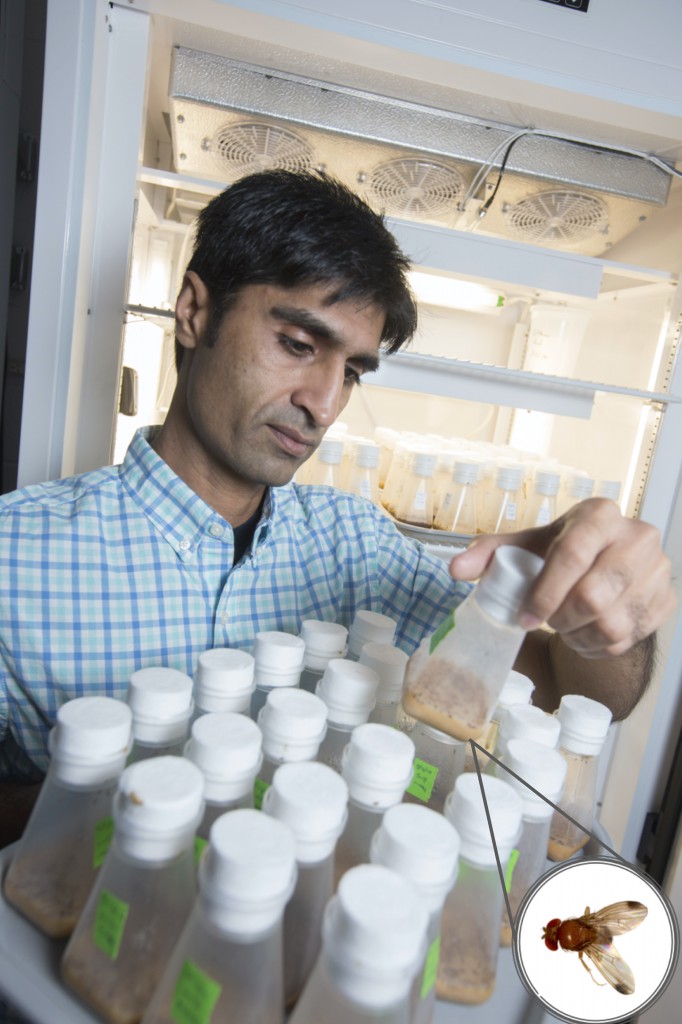Written by: Emily Cabrera, UGA IPM Communications Coordinator
Expert Source: Ash Sial, Blueberry Entomologist & UGA IPM Coordinator

The University of Georgia has just been awarded a $5.4 million grant by the U.S. Department of Agriculture, National Institute of Food and Agriculture through the Specialty Crop Research Initiative (SCRI) to develop long-term sustainable methods for controlling the spotted wing drosophila (SWD).
Spotted wing drosophila is tiny fly native of Asia. It was first detected in California in 2008 and has since emerged as a devastating pest of small and stone fruits throughout the U.S., valued at $5.8 billion annually.
Blueberry entomologist and coordinator of the Integrated Pest Management Program, Ashfaq Sial, is once again leading a multi-regional team of researchers from ten major Land-Grant Universities and USDA-ARS to develop and implement long-term sustainable strategies to control SWD. This project builds on previous work where the goal was to urgently develop control strategies to respond to the crisis situation created after the detection and widespread distribution of this devastating invasive pest in all fruit growing regions throughout the United States. The team made substantial progress by refining monitoring tools, developing effective insecticide-based management programs, identifying effective cultural controls, and screening native and exotic biological control agents to address the crisis phase of SWD invasion.
“The progress we’ve made is great, but SWD management is still highly insecticide-dependent and is further challenged by secondary pest outbreaks, insecticide resistance, and increased input costs,” explained Sial. “Because SWD has become established as a keystone pest throughout the U.S., it is critical to develop more sustainable strategies to manage SWD.”
The goal of this project is to pivot away from crisis response to build a long-term, integrated and systems-based approach to managing SWD. In this new project, the team will work with region- and crop-specific teams of grower influencers to implement best management programs for sustainable SWD management in collaboration with grower stakeholders, develop economics-based decision aid tools to increase profitability, evaluate sustainable alternatives to insecticides for long-term SWD management, assess and reduce the risk of insecticide resistance development, and develop and disseminate actionable recommendations that enable producers to optimize pest management decisions, and evaluate their impact.
Ultimately, the team hopes to develop and deliver systems-based integrated management programs to berry and cherry growers that are cost-effective and environmentally-sustainable for long-term management of SWD in the U.S. Implementation of these sustainable solutions will directly contribute to the long-term profitability and sustainability of farms and farmers nationwide.
Joining Sial on this project from CAES is nationally and internationally recognized impact evaluation expert, Kay Kelsey. Additional collaborators and their institutions are: Hannah Burrack, North Carolina State University; Kent Daane, University of California Berkeley; Rufus Isaacs, Michigan State University; Greg Loeb and Miguel Gomez, Cornell University; Cesar Rodriguez-Saona, Rutgers University; Philip Fanning, University of Maine; Elizabeth Beers, Tobin Northfield, Karina Gallardo and Gwen Hoheisel, Washington State University; Vaughn Walton, Oregon State University and Joanna Chiu and Frank Zalom, University of California Davis and Kim Hoelmer and Xingeng Wang, USDA Agricultural Research Service in Newark, Delaware.
To learn more on pest management strategies and research, visit the UGA IPM Blog at site.extension.uga.edu/ipm.